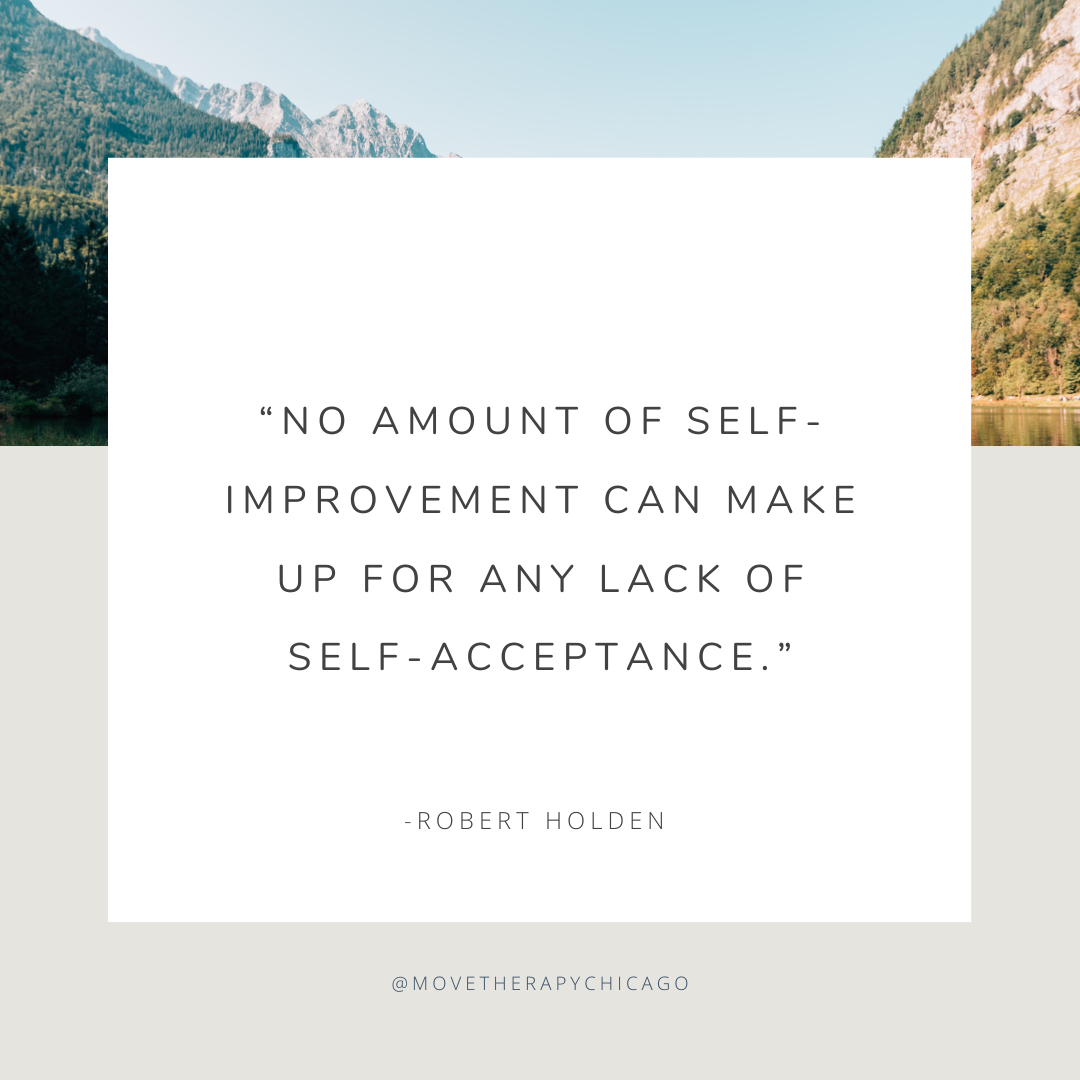“No amount of self-improvement can make up for any lack of self-acceptance.” -Robert Holden
Self-acceptance is the ability to embrace all aspects of ourselves, not just the positive traits. The more accepting of ourselves we are, the happier we feel overall. We often place numerous conditions on our ability to accept ourselves (“if only I were more ______, then I’d be able to love and accept myself.”). True self-acceptance is unconditional–it’s being okay with who we are without the need to “fix” anything. An attitude of self-acceptance may not come naturally, but with effort and intentionality you can cultivate self-acceptance. Here are some ways to do that:
Increase your awareness of your “inner critic.”
Awareness must precede change–we can’t change something that we aren’t aware is happening. Negative self-talk is often an overt and insidious thought process that we rarely, if ever, question or examine. One way to bring awareness to your negative self-talk is to keep an “inner critic log” for a week by taking note (either in a notebook or using the “notes” app on your phone) of every single negative thought you have. While this can feel somewhat disheartening, it is an honest and eye-opening way to see the negative self-talk we tolerate on a daily basis. It’s possible that this exercise alone can be a “lightbulb moment” that motivates you to speak to yourself more kindly.
Be kinder to yourself.
We are often our own harshest critics. We tend to overestimate how much others notice about us, particularly our flaws or shortcomings– a phenomenon that social psychologists call the spotlight effect. Our assumption that the spotlight is always on us is a fallacy– the things we are most critical or judgmental of ourselves for are often barely recognizable (or at least not nearly as important as we deem it to be) to others. Remembering this in the midst of self-judgment can help let ourselves off the hook, so to speak. One way to be kinder to ourselves in response to self-judgment or criticism is to consider what we would say to a friend in a similar situation. Chances are, we would never talk to a friend the way we talk to ourselves.
Question the “conditions” you place on being able to love and accept yourself.
How would you fill in the blank “if only I were more _______, then I’d be able to love myself”? Take the answers to that question and pick them apart a bit more. For example, let’s say you filled in the blank with “thin.” Why is it so important that you are thin? How is your weight tied to who you are? Are there other perspectives? Could others potentially see your weight differently than you do? If you were more accepting of yourself, what would you be saying to yourself instead?
Refocus your attention.
Oftentimes we spend more time obsessing or dwelling on our perceived shortcomings than we do admiring the parts we love (or at least don’t hate) about ourselves. Dwelling on our shortcomings really doesn’t serve any functional purpose; obsessing over your shortcomings doesn’t change your shortcomings. It’s best that you catch yourself as early on in these thought processes and train your brain not to indulge in negative thought patterns by redirecting your attention. You can do this simply by engaging in a distracting activity and diverting your attention elsewhere. You can also redirect yourself by counterbalancing negative thoughts with positive thoughts by identifying something you love about yourself. Maybe you even adopt the “equal time rule” and attempt to spend as much time dwelling on the positive aspects of yourself as you do the perceived negative aspects. Another way to refocus your attention is to create an affirmation that you can mentally repeat to yourself in response to negative self-talk. Here are some affirmations that may be helpful:
I love and accept myself just as I am.
I know my worth.
I show myself kindness and grace.
I am not my negative thoughts or emotions.
I deserve my own love.
I am enough.
I embrace my imperfections.
I let go of negative self talk.
I accept myself unconditionally
If it’s hard to say something so definitively, or if it feels disingenuous to do so, you can add “becoming” or “learning” to make it sound more realistic. For example:
I am learning to love and accept myself just as I am.
I’m learning to know my worth.
I’m learning to show myself kindness and grace.
Limit social media usage.
Social media enables us to present our “best selves” to the world. Unfortunately, this often results in unfair comparisons we make between others’ “best selves” and our entire, authentic selves– the good, the bad, and the ugly. We also tend to compare the aspects of ourselves we are self-conscious about to others who have the best version of that same thing. For example, you may compare your body to a fitness blogger who frequently posts pictures flaunting her six-pack in a bikini. That is an unfair and extreme comparison. When you notice yourself playing the comparison game with yourself, be realistic. Are there people you are more physically fit than? Where do you realistically fit into the spectrum of physical fitness? Be selective about who you follow and how much time you spend scrolling through social media apps. It may be a nice way to unwind and pass the time after a long workday, but how does it really make you feel after?
Embed self-acceptance into your daily routine.
Every night before bed, write down three of your accomplishments from the day. Next to each, identify the personality trait you possess that facilitated that accomplishment. For example: “Exercised before work → disciplined.” Take a moment after completing a task to thank and congratulate yourself. When you’re struggling, place your hands over your heart and hold your suffering like a mother would a young child. Find other ways to express self-compassion to yourself.
